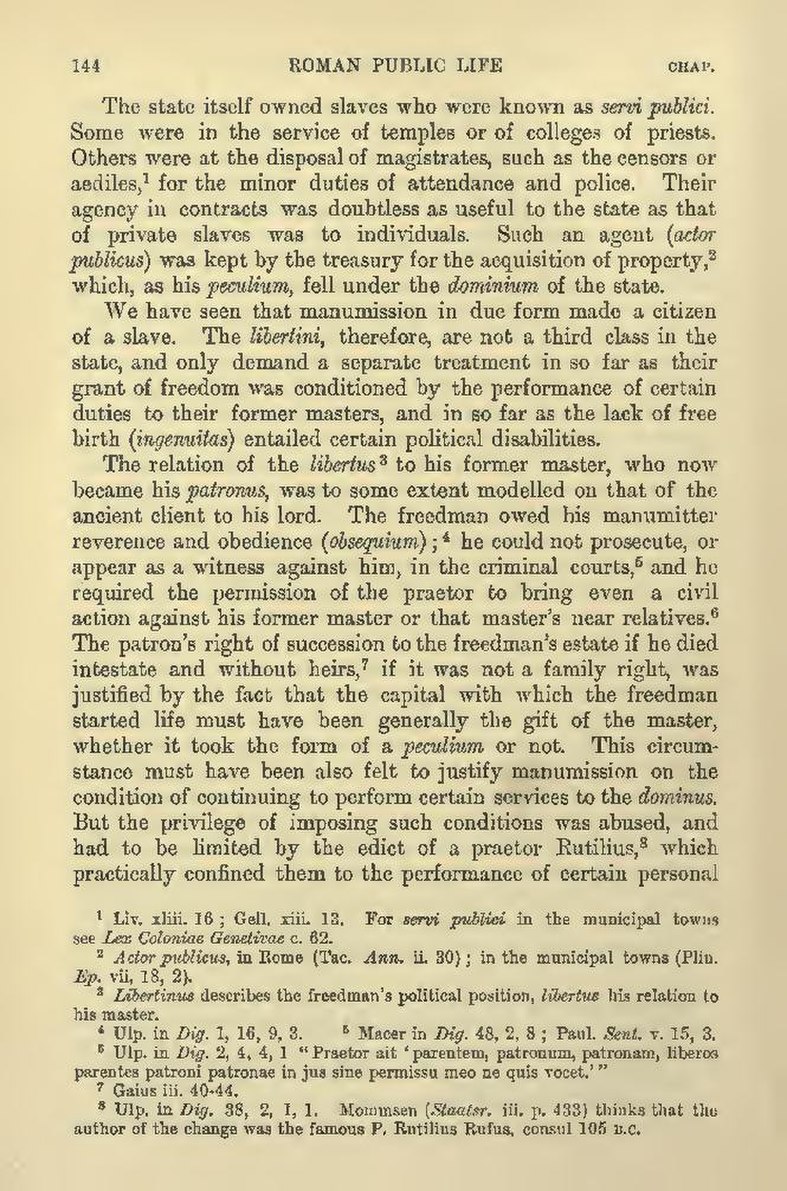The state itself owned slaves who were known as servi publici. Some were in the service of temples or of colleges of priests. Others were at the disposal of magistrates, such as the censors or aediles,[1] for the minor duties of attendance and police. Their agency in contracts was doubtless as useful to the state as that of private slaves was to individuals. Such an agent (actor publicus) was kept by the treasury for the acquisition of property,[2] which, as his peculium, fell under the dominium of the state.
We have seen that manumission in due form made a citizen of a slave. The libertini, therefore, are not a third class in the state, and only demand a separate treatment in so far as their grant of freedom was conditioned by the performance of certain duties to their former masters, and in so far as the lack of free birth (ingenuitas) entailed certain political disabilities.
The relation of the libertus[3] to his former master, who now became his patronus, was to some extent modelled on that of the ancient client to his lord. The freedman owed his manumitter reverence and obedience (obsequium);[4] he could not prosecute, or appear as a witness against him, in the criminal courts,[5] and he required the permission of the praetor to bring even a civil action against his former master or that master's near relatives.[6] The patron's right of succession to the freedman's estate if he died intestate and without heirs,[7] if it was not a family right, was justified by the fact that the capital with which the freedman started life must have been generally the gift of the master, whether it took the form of a peculium or not. This circumstance must have been also felt to justify manumission on the condition of continuing to perform certain services to the dominus. But the privilege of imposing such conditions was abused, and had to be limited by the edict of a praetor Rutilius,[8] which practically confined them to the performance of certain personal
- ↑ Liv. xliii. 16; Gell. xiii. 13. For servi publici in the municipal towns see Lex Coloniae Genetivae c. 62.
- ↑ Actor publicus, in Rome (Tac. Ann. ii 30); in the municipal towns (Plin. Ep. vii, 18, 2).
- ↑ Libertinus describes the freedman's political position, libertus his relation to his master.
- ↑ Ulp. in Dig. 1, 16, 9, 3.
- ↑ Macer in Dig. 48. 2, 8; Paul. Sent. v. 15, 3.
- ↑ Ulp. in Dig. 2, 4, 4, 1 "Praetor ait 'parentem, patronum, patronam, liberos parentes patroni patronae in jus sine permissu meo ne quis vocet.'"
- ↑ Gaius iii. 40-44.
- ↑ Ulp. in Dig. 38, 2, 1, 1. Mommsen (Staatsr. iii. p. 433) thinks that the author of the change was the famous P. Rutilius Rufus, consul 105 B.C.
